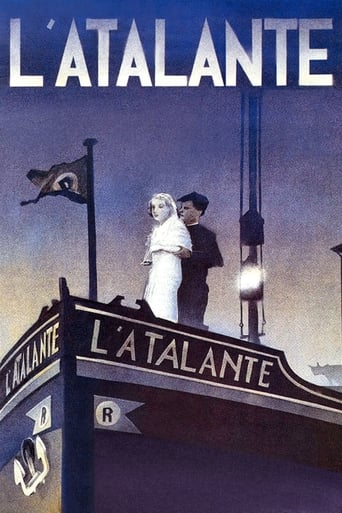preppy-3
Country girl Juliette (Dita Parlo) marries Jean (Jean Daste) who lives and works on a barge. She slowly discovers that living on a barge is not what she wants and it leads to complications in her marriage.The story is simple but the movie is GREAT! It's told quickly and quietly with good acting and direction. The director conveys everything through imagery. The cinematography is breath-taking--gorgeous black and white images are all over the film. The actors are as good as they can be with especially excellent work by Parlo and Michel Simon. The director (Jean Vigo) sadly died at the too young age of 30 only completing three films. If he had lived he would have been one of the greats. Highly recommended.
Sergeant_Tibbs
L'Atalante is one of those films I've heard of a lot in the well respected critics list, as you can see, it's highly ranked in They Shoot Pictures Don't They's list, but I've never known enough about it besides the fact that the director, Jean Vigo, died after making it at age 29. It is a truly unique, poetic and dreamy film and does deserve its acclaim. At the core, it's a film about the differences between men and women and how the frustration and anger of that tension drives them together and apart. It's surprising to see a film from pre-1950s to feature such vulgarities as a picture of a naked woman, the use of the word "pussy" referring to a vagina and frequent references to sex and sexual pleasure. But perhaps I haven't seen enough pre-1950s films to truly judge.The relationship between the main couple, Jean and Juliette, is incredibly passionate, even if the jealousy and worry can seem ugly on them. Their separation during the second half is upsetting and the audience really wills them to be together. While it plays with surrealism and faux- surrealism - such as the ambiguity of the second mate Pere's gender and showing him play a record on his finger that turns out to be the cabin boy playing the accordion - the eccentric side characters, including Pere, bring a special layer to the film, even making it genre breaking with slapstick and musical moments. The second half of the film is significantly better than the plodding first half though, where the cinematography is more creative and features excellent framing with lots of high and low angles, use of reflections and silhouettes which give the film a marvellous texture and adds to the atmosphere. It is a really complex film which I know I won't grasp on a single viewing and analysis but an excellent film nonetheless. 8/10
museumofdave
If you have patience for a black and white foreign film that's seventy years old, that takes you to a world which no longer exists, a honeymoon on the Seine, the young couple attempting to find some romance amid quirky squalor, a sailor's world of work and drink, a place where a bride must learn to shift for herself when her husband fails to understand her need for a little magic, well-this is that film. An actor named Michel Simon essays an eccentric boatman who loves cats, keeps his perhaps-lovers severed hands in a jar, and who loves his old phonograph, steals much of the picture, but the cinematographer swipes even more, with moods of shadows and light hovering around some of the most erotic non-explicit lovemaking ever put on film. Director Vigo's longest film is a challenge to watch, but worth filing in your movie gems library. It is both groundbreaking and heart-warming, intelligent and experimental. L'Atlante is a classic that continues to earn it's status.
wandereramor
L'Atalante is one of those films that doesn't really survive it's critical reputation. It's not so much that it's overrated as that its status as a Cinematic Masterpiece by a French Auteur casts a heavy burden on it which the light, airy film can't escape.But enough meta-criticism. Taken on its own, L'Atalante is a charming film about a honeymoon whose light nature and relaxed pace manages to immerse the audience in a realm of simple pleasure. There's little dialogue, and Vigo draws on the attractions of silent film, with a lot of light humour and simple representational images. It's a world you would want to step into, and one that you almost think you can.Alas, things cannot stay so serene forever, and so trouble eventually arrives in our honeymooners' relationship. The plot is believable and well-observed, if not exactly captivating, but I have to say I missed the more leisurely early parts.I can't help but compare L'Atalante with a film with a similar storyline and inverted structure, F. W. Murnau's Sunrise. L'Atalante undeniably comes off worse in the comparison: it simply doesn't achieve the epic grandeur that Sunrise does. That doesn't mean it's bad, but it seems unavoidably like a prototype for a film released in the previous decade, and that makes it hard to live up to the hype. Still, it's a nice experience, and that's more than you can say about most films.




